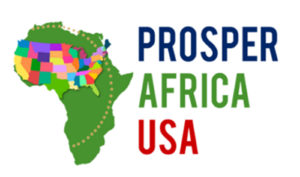BOOSTING TRADE AND INVESTMENT BETWEEN THE UNITED STATES AND AFRICA
 The 12-point overview
The 12-point overview
- On December 13, 2018, the Trump administration launched the Prosper Africa initiative, which seeks to open markets for American businesses, grow Africa’s middle class, promote youth employment opportunities, improve the business climate, and enable the United States to compete with China and other nations who have business interests in Africa.
- It is a U.S. Government Initiative that unlocks opportunities to do business in Africa — benefiting companies, investors, and workers both in Africa and the United States.
- The objective is to substantially increase two-way trade and investment between the United States and Africa. The Trump administration’s message to Africa has been blunt: Choose the United States over China and Russia.
- With six of the ten fastest growing economies in the world and over one billion consumers, Africa is poised to play a pivotal role in the global economy. Meanwhile, producers in Africa see a U.S. consumer market of more than 300 million people that already has a purchasing power of $13 trillion — the largest in the world. American companies not only bring significant capital, innovation, and proven solutions, but adhere to the highest standards of transparency, quality, and social responsibility. A greater connection between the U.S. and African private sectors will expand markets for U.S. goods and services and contribute to more self-reliant, prosperous, and stable African countries.
- Prosper Africa aims to substantially increase two-way trade and investment between the United States and Africa, focusing on four vectors:
a. U.S. exports to Africa,
b. African exports to the United States,
c. U.S. investment to Africa and
d. African investment to the United States. - Through Prosper Africa, the U.S. Government helps to unleash the entrepreneurial spirit of Americans and the people of African nations like never before — advancing American and African prosperity and security, supporting jobs, and demonstrating the superior value of transparent markets and private enterprise for driving growth.
- While commercial diplomacy has long been a tool for global engagement, the emphasis on the threat of competition from China is stark. China’s trade with Africa is three time that of the U.S. – $148 billion in 2017 versus America’s $55 billion. While Prosper Africa is said to be “demand driven” by the private sector, it is unclear whether Prosper Africa will target its investments to directly challenge China.
- USAID is the co-lead for Prosper Africa along with the Commerce Department. This makes sense since increasing trade and investment in Africa is only possible if the U.S. helps build African capacity to encourage investment and works to remove barriers that constrain American business investment such as poor infrastructure, lack of transparency, and time-consuming customs practices.
- Like exports, imports to the US come primarily from just a handful of countries. Three quarters of all imports (2016-2018) come from South Africa, Nigeria (mostly oil), Angola (also mostly oil), and Cote d’Ivoire. Forty-five other Sub-Saharan African countries currently export relatively little to the US.
- Through Prosper Africa, the US government is looking to deepen commercial relationships with these largest trade partners. The Department of Commerce has signed MOUs with Cȏte d’Ivoire, Ethiopia, Ghana, and Kenya to increase bilateral trade and investment. An MOU with Mozambique—which isn’t currently among the largest US trade partners but is attracting massive US investment into its burgeoning natural gas industry—is forthcoming.
- Prosper Africa “is not a program,” according to USAID Administrator Green, and will not create new tools to promote trade and investment with Africa but seeks to better coordinate the existing tools across 15 agencies in the U.S. government. Prosper Africa brings together the resources of over 15 U.S. Government agencies, aka the “Deal Team”, to connect U.S. and African businesses with new buyers, suppliers, and investment opportunities.
- Participating Agencies: